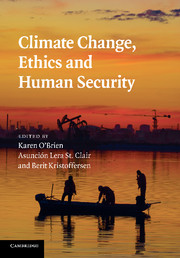Book contents
- Frontmatter
- Contents
- Contributors
- Foreword
- Preface
- Part I Framings
- Part II Equity
- Part III Ethics
- 6 Ethics, politics, economics and the global environment
- 7 Human rights, climate change, and discounting
- 8 Climate change as a global test for contemporary political institutions and theories
- Part IV Reflexivity
- Index
- References
8 - Climate change as a global test for contemporary political institutions and theories
Published online by Cambridge University Press: 01 June 2011
- Frontmatter
- Contents
- Contributors
- Foreword
- Preface
- Part I Framings
- Part II Equity
- Part III Ethics
- 6 Ethics, politics, economics and the global environment
- 7 Human rights, climate change, and discounting
- 8 Climate change as a global test for contemporary political institutions and theories
- Part IV Reflexivity
- Index
- References
Summary
If political leaders have one duty above all others, it is to protect the security of their people … And yet our long-term security is threatened by a problem at least as dangerous as chemical, nuclear or biological weapons, or indeed international terrorism: human-induced climate change.
Houghton (2003)Why should political philosophy be concerned about global environmental change, in general, and climate change, in particular? Why aren't these just normal political problems, perplexing in their scale, perhaps, but not fundamentally different to most other problems in domestic and international affairs? Why isn't the political problem, insofar as there is one, simply that certain actors have behaved badly, for the usual political reasons? This chapter is an attempt to offer one central answer to such questions. It does so by advancing a minimal global test for social and political institutions and theories, and then suggesting that conventional versions of both may fail in the case of climate change. If this argument is correct, then climate change presents a major challenge to global systems. This implies that the current, almost exclusive, focus on scientific and economic questions is a dangerous mistake.
The structure of the chapter is as follows. The first section, “The global test,” introduces the global test and provides some general reasons for believing that it may apply in the case of climate change.
- Type
- Chapter
- Information
- Climate Change, Ethics and Human Security , pp. 131 - 154Publisher: Cambridge University PressPrint publication year: 2010
References
- 2
- Cited by

